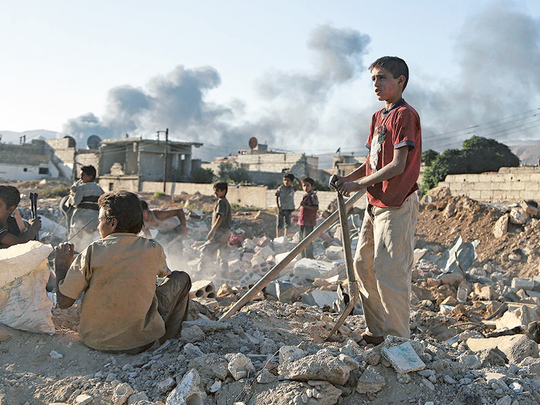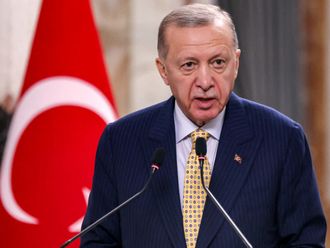
Dubai: Since the formation of the modern Middle East after the end of the Second World War, there has hardly been a time when peace and stability have prevailed across the region. The emergence of Israel in 1948 and the Nakba that followed; the Arab-Israeli wars of 1967 and 1973; the Islamic Revolution in Iran in 1979; the Iran-Iraq war of the 1980s; the Gulf War in the early 1990s; the 2003 US-led invasion of Iraq — the list is long and blood-soaked. But with the promise of the 2011 ‘Arab Spring’ giving way to the chaos and shocking violence we see on our TV screens today, things have reached a new low. There is, it appears, no mechanism for ending violence through dialogue between regional and global powers. Have war and peace in the Middle East become a zero sum game?
There are local fronts and more regionalised fronts to the instability pervading the Middle East today, believes Dr Fanar Haddad, a Research Fellow at the Middle East Institute in the National University of Singapore. He told Gulf News: “Some of these have become zero sum games. Iraq’s conflict with Daesh [the self-proclaimed Islamic State of Iraq and the Levant] is a case in point as is, unfortunately, the broader conflict in Syria. In Iraq, the nature of Daesh, the nature of its conflict with the Iraqi state and the balance of power between the two make it a zero-sum game. As for Syria, I think it has turned into a zero-sum game for the meantime and will continue to be so as long as the respective sides enjoy the international and military support that they do.”
Currently, there seems to be little incentive for compromise and no common ground on which to negotiate. Haddad said: “Rebel forces insist on Al Assad’s departure, and the regime insists on Al Assad’s presidency and both sides seem to believe that they have enough strength and international support to win an outright military victory.”
Abdel Bari Atwan, the editor-in-chief of Rai Al Youm, a digital news and opinion website specialising on the Arab world, and a Gulf News columnist, said that at the international level, peace in the region is not a zero sum game. “There is rapprochement on some issues, as both of them have one common enemy, Daesh. But between regional powers — Saudi Arabia and Iran — the differences are huge and won’t be bridged easily.”
Speaking to Gulf News from London, Atwan said that the focus must be on countering the primary threat to everyone in the region and beyond — Daesh. “How to unite and focus on removing Daesh from the region, that should be the question. [Syrian President] Bashar Al Assad has a few enemies, but Daesh has over 50 countries lined up to fight against it. Al Assad is a small player when compared to Daesh; he is too weak to threaten anyone anymore.”
Atwan said that the ‘Arab Spring’ actually consolidated America’s already existing view that the Middle East was a ‘problem area’. “The US was in the process of shifting its focus towards the Asia-Pacific region. It had tried everything in Iraq and failed. Now, it is just trying to limit the damage; to contain the situation. It is doing that through airstrikes against Daesh and by providing a few advisers and special forces to the government in Afghanistan. Despite all the noise that is being made, America will not send ground forces into Iraq to fight Daesh. The terrorist group has become self-sufficient financially. It has a lot of land under its control and it is difficult to root it out.”
The world powers’ deal with Iran over its nuclear programme has raised the stakes dramatically in the regional power game. But the fact that Washington and its partners have reached a deal with Tehran does not automatically diminish a US-Gulf relationship that both sides have built over decades. Haddad said, “The US retains significant interests in its relations with the Gulf and vice versa. We have to wait and see how the nuclear deal pans out and how Iran will use the financial and diplomatic advantages that the deal accords it. The Gulf’s relationship with the US remains important but will have to adapt to the new realities imposed by the nuclear deal.”
So what is the single biggest reason for the continuous state of flux that has existed in the region for the past few decades? “It is difficult to identify a single reason. The most proximate driver is the collapse of older forms of authoritarian rule and the collapse of the balance of power between various political, social and regional forces. However, a deeper reading of the situation would have to take account of the cumulative factors that emerge from a near century’s-worth of failed state and nation building in places like Iraq, Syria and elsewhere,” Haddad said.











